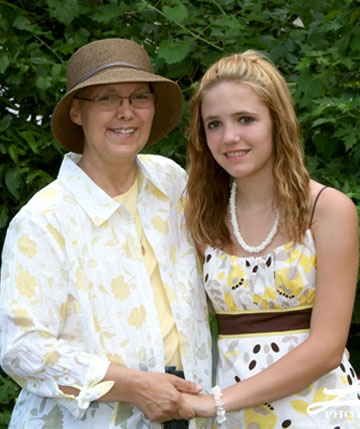Stories
Replacing crisis with plans and support

By the time Thea Johnson was born, she had already faced more challenges than most babies will ever know. Her mother, Paula, had been diagnosed with advanced breast cancer the same day she learned she was pregnant. When Paula went into labor nearly two months early, Thea entered the world medically fragile, needing oxygen and a heart monitor, and fighting multiple infections. As if she knew the road ahead would be rough, “she screamed nonstop,” says her aunt, Erika Frake. “You couldn’t soothe her.”
That road turned out to be rougher than anyone anticipated. For the past 16 years, while Paula battled breast cancer, a fight she recently lost, Thea struggled with multiple health issues, developmental delays, and learning disabilities.
“Thea had many sensory issues,” Erika recalls. “Paula was told she would probably be deaf and blind. But Paula was a total advocate for her from the beginning. ‘I know she hears me. I know she sees,’ she would say. Her mission was to help Thea succeed. Paula lived and breathed for Thea. She really fought.”
That advocacy took many forms. Born with a genetic autoimmune disorder and many allergies, Thea was medically complicated. “A lot of times we didn’t know whether Thea would live or die,” Erika says, noting that her niece would be in the hospital for months at a time.
School was a struggle, too. Frequent hospitalizations meant a lot of missed classes, and Thea was just expected to catch up on the work she’d missed. In addition, Thea has ADHD and dysgraphia, a learning disability that affects handwriting and the ability to express thoughts in written form. She couldn’t copy images, so learning to write was tedious. “She had trouble learning concepts, such as telling time. She doesn’t learn in a traditional format,” Erika says. “Teachers didn’t know what to do, and they didn’t have time to work with her.
“Paula was in tears many days,” she recalls. “She’d say, ‘I just want her to be able to learn. No one’s working with her.’ The family was in desperate need,” Erika says, as they faced mounting medical bills, constant stress, and education barriers.
Then, when Thea was 10, someone suggested that Paula call PACER Center. “I still remember when she called me in tears telling me about PACER and the wonderful people there,” Erika says. “She said, ‘Can you believe it? They do everything to make sure Thea will have what she needs in school. I don’t have to face this alone anymore! We’re implementing an Individualized Education Program (IEP). PACER told me things no one else had told me about. And they helped us sort out the insurance issues and find personal care assistants so we can have respite care.’”
It was a turning point. Instead of moving from crisis to crisis, they had a plan and support. The IEP addressed many issues and ensured that Thea would receive tutoring during her long hospitalizations. Thea, meanwhile delved into PACER’s technology workshops, Creation Station art activities, and the popular EX.I.T.E. technology and science camp for middle-school girls with disabilities.
“Thea is actually doing very well now,” Erika says. “She’s a typical teen. You would never guess in talking with her that she has learning disabilities. Her main issues are still with writing and math.”
Throughout this journey, Paula was in and out of remission, coping with her own health issues while raising Thea and three other children with her husband. Eventually, her cancer spread to her bones and treatments stopped working. Knowing that her time was limited, Paula began to worry about who would advocate for Thea as she grew older and faced transition issues. Concerned that the time after her death would be very hard for her husband and other loved ones, she worried about whether they would have the strength to advocate for Thea alone during this time.
“She wanted to have a plan of action that was set to go and would continue so Thea would not fall through the cracks,” Erika says. Paula again turned to PACER. “The parent advocates jumped up to the plate,” Erika says, noting that a plan was put into place that would protect Thea’s educational rights in the future.
In January 2009, Paula lost her 16-year battle with cancer. In the grief that has followed, there has been one island of comfort, Erika says. “She told me a few months ago, ‘I know Thea will be okay because even though I can't be her advocate anymore, PACER is still there and will help her.”
By: PACER
| Page 1 of 1 | |||
| First | Previous | Next | Last |

